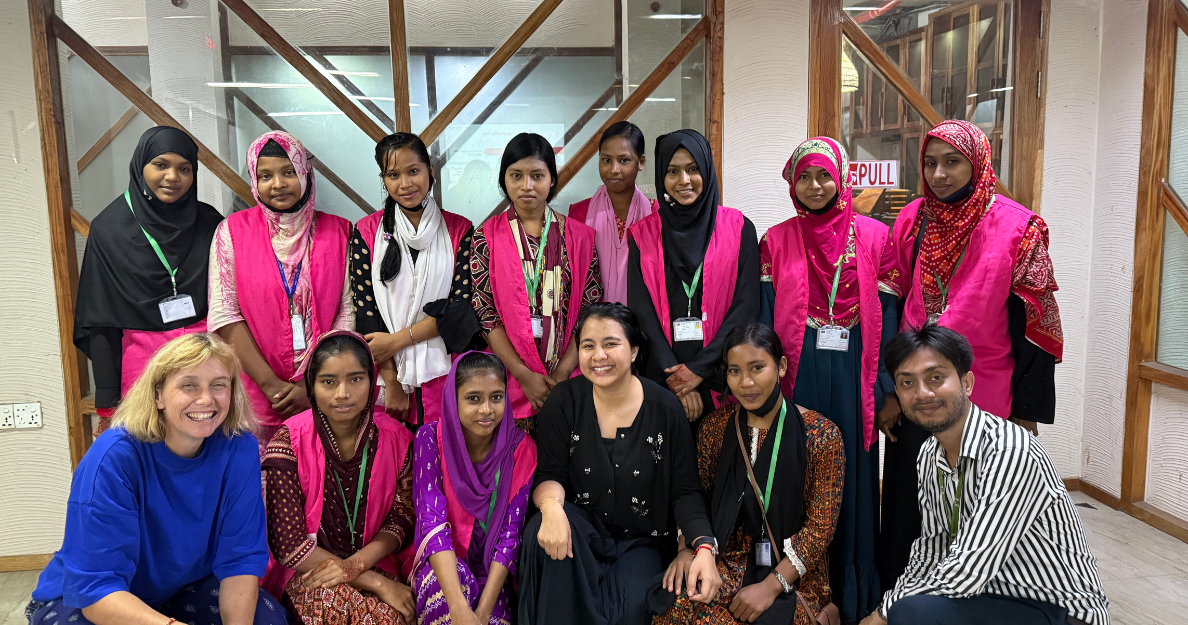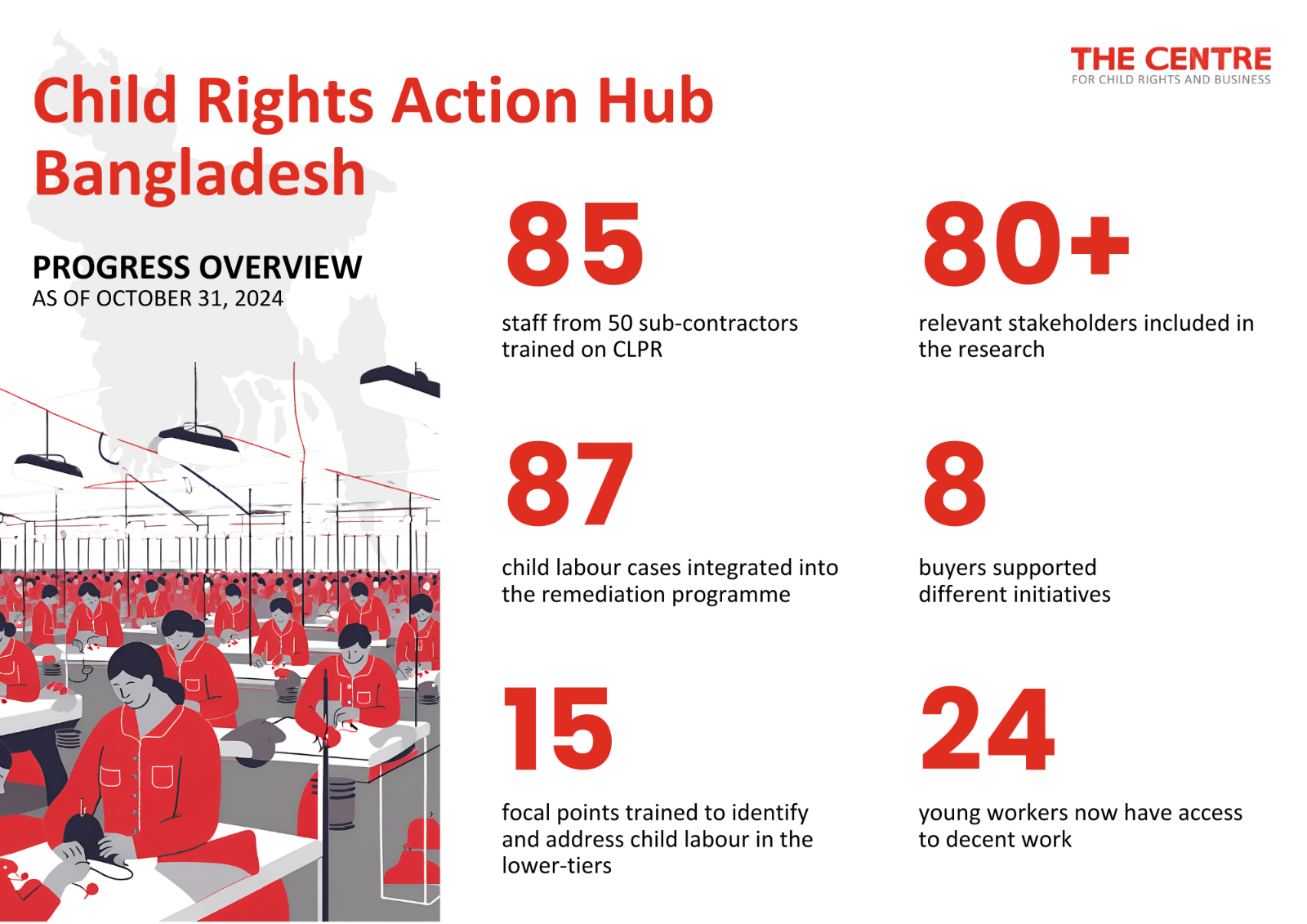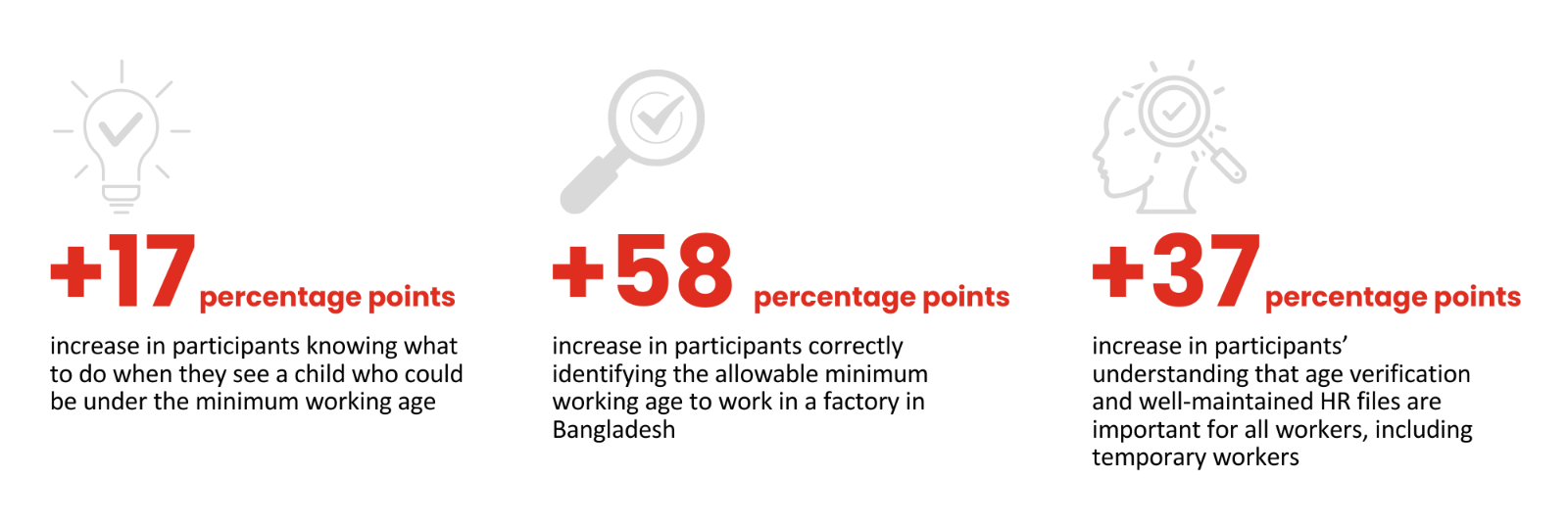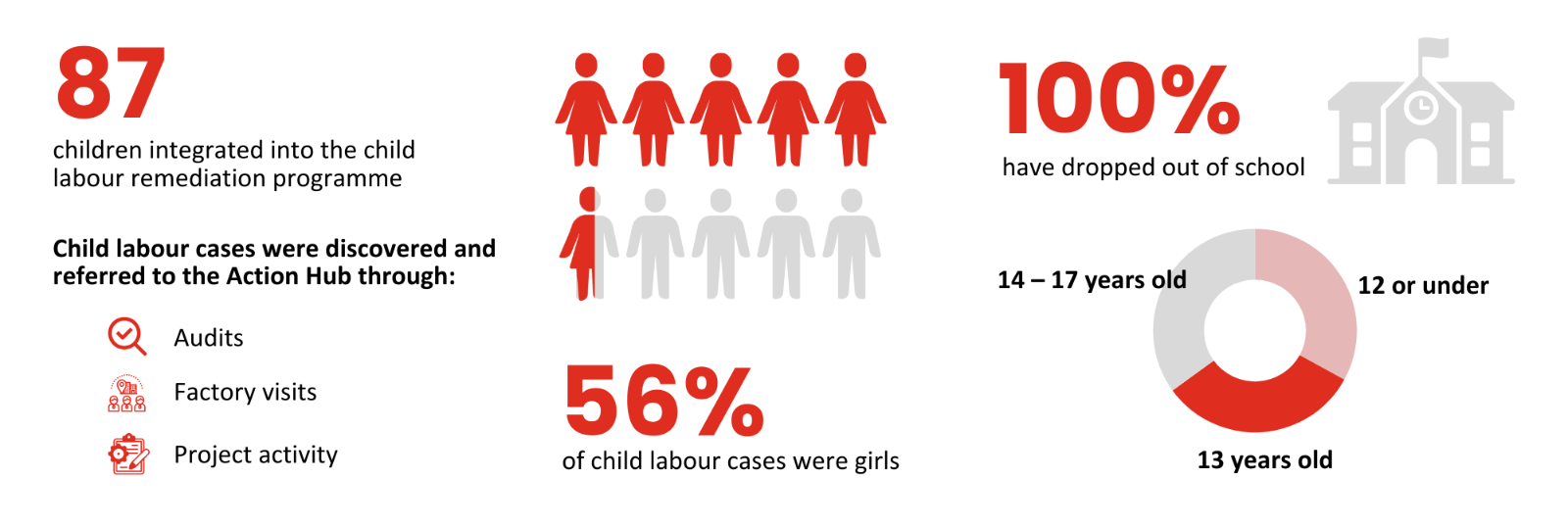

The Child Rights Action Hub (The Action Hub) in Bangladesh, an initiative by The Centre, launched in May 2024 to prevent and remediate child labour at scale in the ready-made garment (RMG) sector by collaborating with buyers, retailers, suppliers, business associations and other industry stakeholders. The Action Hub focuses on lower tiers, where child labour risks are most prevalent.
In just five short months since the Action Hub’s launch, we've made significant strides: training subcontractors on child labour prevention and remediation, enrolling children in our child labour remediation programme, equipping child rights focal points with essential skills and knowledge, ongoing research on risks in the RMG sector in both the upstream and downstream supply chain, and kicking off an Access to Decent Work for Youth (AD-Y) programme in a factory that is now legally hiring and responsibly managing young workers within their premises.
The Action Hub consists of four key workstreams. Scroll down to see our progress in each of these areas.

Workstream 1: Research and Mapping
The first workstream includes identifying subcontractors within Tier-1 factories and assessing child labour risks in lower tiers of the Ready-Made Garment (RMG) sector. To this end, we conducted surveys and interviews with factory management, workers and other service staff. Community mapping exercises have been conducted to deepen the understanding of local challenges and how they impact child rights. Our research found direct linkages between pricing and child labour and it enabled us to understand the training needs and resource availability of lower-tier actors.
Workstream 2: Child labour training and capacity building in lower tiers
The second workstream of the Action Hub centres around efforts to build the capacity of lower tier actors in preventing and remediating child labour. This workstream addresses a key need, as 94% of participants reported having never received any prior training on child labour. The training aims to equip participants with the necessary knowledge and skills to combat child labour within their communities effectively.
In response to this need, we trained 85 staff from 50 sub-contractors, leading to:
Strengthened recruitment processes to ensure greater transparency and robust hiring
Increased understanding of children’s rights and child labour, as well as relevant international and domestic legal requirements
Improved awareness of child labour prevention and remediation compounded by a commitment to implement best practices in their factory
Below is a snapshot of key impact from the training:

We have also trained 21 Tier-1 factories on human rights due diligence regulations, with a particular focus on the EU CSDDD. The training will help them understand and implement the requirements more effectively both in their own factories and within their supply chains.

"For the first time I've received a training on CLPR. I've learned new things today. I’m planning to implement some learnings in our factory, including review our child labour and young worker policies and update and conduct training for our hiring team."

Workstream 3: Access to decent work for youth
Our third workstream includes an Access to Decent Work for Youth (AD-Y) programme that connects young people in need of decent work to safe, well-regulated jobs in factories that adhere to labour laws and young workers’ rights. These factories are given capacity building and in-depth training to run the programme successfully over the long-term.
To this end, one factory has been onboarded 24 young workers into the programme. 35% of these youth were school dropouts with limited opportunities to find formal jobs. A small number of these youth had previously been engaged in hazardous work.
So far, we have made progress in the following areas:
Delivered soft skill training in financial literacy, sexual health, family planning and young worker protection, as well as on-the-job training in technical skills
Conducted Training of Trainers (ToT) for the management who are responsible for the implementation of the programme and managing young workers
Held an information session on the AD-Y programme for factories and brands, as well as for mentors and buddies who are selected from the experienced workers and line leaders
Conducted a capacity building training for factories on how to implement the AD-Y programme
Through this programme, vulnerable youth are taken out of child labour situations and instead, are working regulated hours in accordance with their ages, given fair wages and age-appropriate tasks. At the same time, factories can build a robust talent pipeline and increase retention.


“I have a good relationship with my co-workers and supervisor. The supervisors do not give us trouble and never put pressure on us to meet production goals.”

Workstream 4: Child labour remediation
87 children have been integrated into the Action Hub’s child labour remediation programme to date. Through this programme, they are receiving ongoing support in the form of monthly living stipends, access to education or vocational training and a dedicated case manager who regularly checks in on them and monitors their progress. Most importantly, they no longer have to turn to child labour to support themselves and their families and have a chance to pursue their interests and embark on a brighter path.

"I had a dream that my daughter would be well educated but due to lack of money, I stopped her studies and sent her to the factory to earn money. Today, the Centre has given her the opportunity to study again. I am very grateful to The Centre."

As part of the Action Hub’s child labour remediation efforts, 15 focal points, including community stakeholders such as schoolteachers, healthcare providers, and trade union leaders, have been trained. These focal points are responsible for:
Identifying risks and actual cases of child labour and reporting them to the Action Hub
Supporting the Action Hub’s remediation efforts for child labour cases, which includes initial contact with the child, their family, and their school, as well as monitoring cases
Raising awareness among local community members, including parents, legal guardians, and children
Assisting local families in crisis and linking them to existing child welfare programmes
Below is a snapshot of the demographics from the child remediation programme under the Action Hub:

How to get involved
Eight international buyers currently support the Child Rights Action Hub, and we're inviting more buyers to join us in this initiative. Connect with us to discover how your business can make a lasting impact while strengthening human rights due diligence efforts.
By using this website, you agree to our use of cookies. We use cookies to provide you with a great experience and to help our website run effectively.